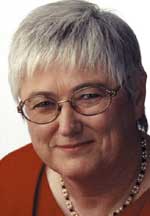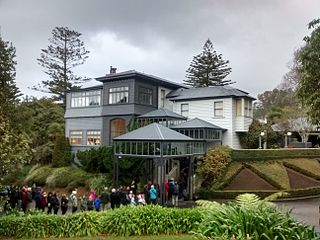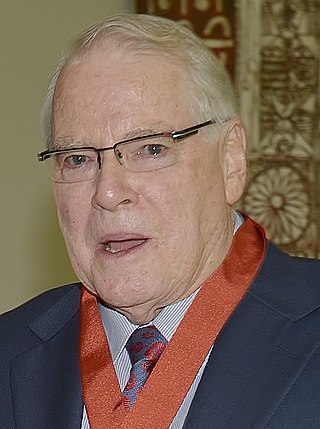
Michael Kenneth Moore was a New Zealand politician, union organiser, and author. In the Fourth Labour Government he served in several portfolios including minister of foreign affairs, and was the 34th prime minister of New Zealand for 59 days before the 1990 general election elected a new parliament. Following Labour's defeat in that election, Moore served as Leader of the Opposition until the 1993 election, after which Helen Clark successfully challenged him for the Labour Party leadership.

The prime minister of New Zealand is the head of government of New Zealand. The incumbent prime minister, Christopher Luxon, leader of the New Zealand National Party, took office on 27 November 2023.

Sir Simon William English is a New Zealand former politician who served as the 39th prime minister of New Zealand from 2016 to 2017 and leader of the National Party from 2001 to 2003 and 2016 to 2018. He had previously served as the 17th deputy prime minister of New Zealand and minister of finance from 2008 to 2016 under John Key and the Fifth National Government.

Peter Fraser was a New Zealand politician who served as the 24th prime minister of New Zealand from 27 March 1940 until 13 December 1949. Considered a major figure in the history of the New Zealand Labour Party, he was in office longer than any other Labour prime minister, and is to date New Zealand's fourth-longest-serving head of government.

Jonathan Lucas Hunt was a New Zealand politician and diplomat. He started a 38-year parliamentary career as the Baby of the House and retired as Father of the House. During that tenure, he was Speaker of the House of Representatives. Afterwards, he served as New Zealand's High Commissioner to the United Kingdom from 2005 to March 2008. He was a member of the Order of New Zealand, New Zealand's highest civilian honour, and given the nickname "Minister for Wine and Cheese" for enjoying those items.

Philip Bruce Goff is a New Zealand politician and diplomat. He currently serves as High Commissioner of New Zealand to the United Kingdom since 2023. He was a member of the New Zealand Parliament from 1981 to 1990 and again from 1993 to 2016. He served as leader of the Labour Party and leader of the Opposition between 11 November 2008 and 13 December 2011.

Dame Annette Faye King is a former New Zealand politician. She served as Deputy Leader of the New Zealand Labour Party and Deputy Leader of the Opposition from 2008 to 2011, and from 2014 until 1 March 2017. She was a Cabinet Minister in the Fourth and Fifth Labour Governments, and was the MP for the Rongotai electorate in Wellington from 1996 to 2017.

Marian Leslie Hobbs is a New Zealand politician who was a Labour Member of Parliament from 1996 to 2008. She was initially a list MP and then represented the Wellington Central electorate. She served as Minister for the Environment and, later, as one of two Assistant Speakers of the House of Representatives. She represented the Dunedin constituency of the Otago Regional Council from 2019 to 2021.

Paul Desmond Swain is a former New Zealand politician. He was a Member of the New Zealand House of Representatives from 1990 until 2008, representing the Labour Party. From 2010 to 2019, he was a councillor on the Greater Wellington Regional Council.

Margaret Anne Wilson is a New Zealand lawyer, academic and former Labour Party politician. She served as Attorney-General from 1999 to 2005 and Speaker of the House of Representatives from 2005 to 2008, during the Fifth Labour Government.

David Francis Caygill is a former New Zealand politician. He was born and raised in Christchurch. He entered politics in 1971 as Christchurch's youngest city councillor at the age of 22. He served as a Member of Parliament (MP) from 1978 to 1996, representing the Labour Party. A supporter of Rogernomics, he served as Minister of Finance between 1988 and 1990. From 2010 to 2019, he was one of the government-appointed commissioners at Environment Canterbury.

Timothy John Groser is a New Zealand former politician and diplomat. A member of the New Zealand National Party, Groser was a Member of Parliament between 2005 and 2015. He held the offices of Minister of Trade, Minister of Conservation, and Minister for Climate Change in the Fifth National Government.

Premier House is the official residence of the prime minister of New Zealand, located at 260 Tinakori Road, Thorndon, Wellington, New Zealand.

Dame Frances Helen Wilde is a New Zealand politician, and former Wellington Labour member of parliament, Minister of Tourism and Mayor of Wellington. She was the first woman to serve as Mayor of Wellington. She was chairperson of the Greater Wellington Regional Council from 2007 until 2015, and since 2019 she has chaired the board of the Museum of New Zealand Te Papa Tongarewa.

Michael Edward Rainton Bassett is a former Labour Party member of the New Zealand House of Representatives and cabinet minister in the reformist fourth Labour government. He is also a noted New Zealand historian, and has published a number of books on New Zealand politics, including biographies of Prime Ministers Peter Fraser, Gordon Coates and Joseph Ward.

Women's suffrage was an important political issue in the late-nineteenth-century New Zealand. In early colonial New Zealand, as in European societies, women were excluded from any involvement in politics. Public opinion began to change in the latter half of the nineteenth century and after years of effort by women's suffrage campaigners, led by Kate Sheppard, New Zealand became the first nation in the world in which all women had the right to vote in parliamentary elections.

The Fifth Labour Government of New Zealand was the government of New Zealand from 10 December 1999 to 19 November 2008. Labour Party leader Helen Clark negotiated a coalition with Jim Anderton, leader of the Alliance Party. While undertaking a number of substantial reforms, it was not particularly radical compared to previous Labour governments.

Stanley Joseph Rodger was a New Zealand politician of the Labour Party. He was president of the Public Service Association between 1970 and 1973 and Member of Parliament for Dunedin North from 1978 to 1990.

Helen Elizabeth Clark is a New Zealand politician who served as the 37th prime minister of New Zealand from 1999 to 2008 and was the administrator of the United Nations Development Programme from 2009 to 2017. She was New Zealand's fifth-longest-serving prime minister, and the second woman to hold that office.
Judy Coralyn Sylvia Callingham is a New Zealand scriptwriter, television presenter and journalist. Since the 1970s, she has worked on numerous New Zealand television dramas including Close to Home, Homeward Bound, Duggan and Marlin Bay. She is a former deputy chair of NZ On Air, and together with her husband Brian Edwards runs a media training consultancy company.



















